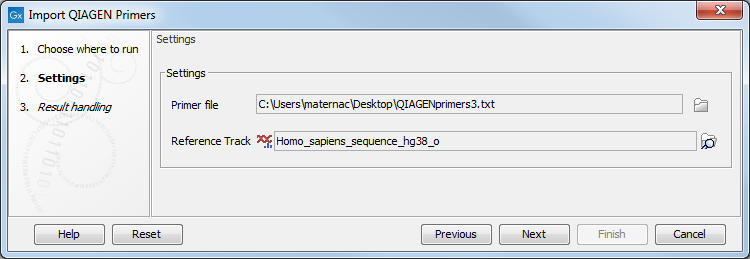Import QIAGEN Primers
When creating a custom analysis workflow, it is possible to specify a Primer annotation track using the import button to the right of the relevant field in the Add custom panel dialog. Importing such a file can also be done ahead of time using the Import QIAGEN Primers tool.
The Import QIAGEN Primers importer can import a QIAseq Panel primer file previously saved on your computer. During import, the primers used for targeted resequencing are saved in the Navigation Area of the workbench as a Primer track. Note: the Import QIAGEN Primers tool is different from the Import Primer Pairs tool because of the format of the primer file it can handle (see below for a detailed description of the format).
The Import QIAGEN Primers can be found in the toolbar:
Import (![]() ) | Import QIAGEN Primers (
) | Import QIAGEN Primers (![]() )
)
The import wizard is shown in figure 2.10. The first step is to select the primers to import and a reference sequence.

Figure 2.10: Select files to import.
- Primer File Click on the folder icon to select the file you received upon purchased of a QIAseq Panel. The name of the file should include
primer3.txt. - Reference Track Choose the hg19 or the hg38 reference sequence that are saved in the Workbench after you have downloaded the hg19 (or hg38) in the Reference Data Manager. The sequence can be found in the CLC_References folder in the Navigation Area tab, or using the QIAGEN Active sets folders in the Reference Data tab.
Click on the button labeled Next to go to the wizard step choose to save the imported primer location file.
QIAseq panel primer formats
The QIAseq panel primers are provided upon purchase of a kit, and the file can have the following formats:
The file format is a tab-separated file with 4 columns defining:
- Chromosome
- Primer start/end position (0-indexed)
- Whether the primer is on the plus strand indicated by an "L" or a "0", or on the minus strand indicated by an "R" or a "1".
- The bases of the primer.
For example, the lines
chr1 1887011 L AGAATATTTTCTTGCTTAACCGTCACTTAACATCGA
chr1 1900114 R GGGACAAGACCTGGAACTACATTTCTGACT
define the primers:
On chr1, from 1886977 to 1887012 (both are 0-indexed, inclusive), on the plus strand.
On chr1, from 1900114 to 1900144 (both are 0-indexed, inclusive), on the minus strand.
The second file format is a tab-separated file with 6 or 7 columns defining:
- Primer count (this value is ignored during import)
- Chromosome
- Start position (0-indexed) when on the "+" strand or End position (0-indexed) when on the "-" strand
- End position (0-indexed) when on the "-" strand or Start position (0-indexed) when on the "+" strand
- Strand ("+" or "-")
- The bases of the primer
- Target annotation (optional)
For example, the lines:
14 chr1 1886977 1887012 + AGAATATTTTCTTGCTTAACCGTCACTTAACATCGA COPA
2 chr1 1900114 1900144 - GGGACAAGACCTGGAACTACATTTCTGACT RCSD1
define the primers from the previous example, with their target annotation.
